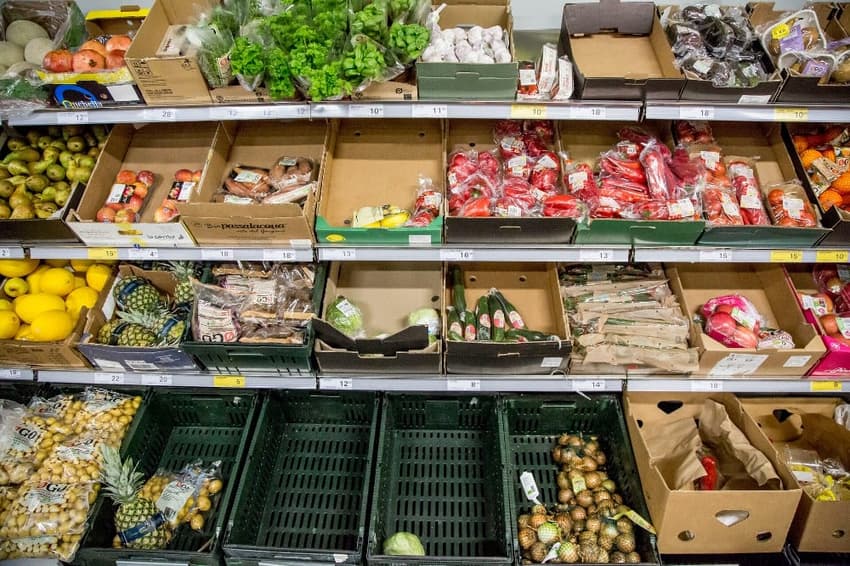German inflation slows sharply in May

German inflation fell sharply in May on lower energy costs, official data showed Wednesday.
Germany's annual inflation rate eased to 6.1 percent, down from 7.2 percent in April, the federal statistics office Destatis said in preliminary figures.
Analysts surveyed by FactSet had expected a May reading of 6.4 percent, meaning that cost of living in Germany went up again, but by a little less than originally expected.
The drop was partly down to the comparison with May 2022, when energy prices soared in the wake of Russia's invasion of Ukraine.
Energy prices have come down from their peaks in recent months, helped by government relief measures to cushion the impact on consumers and businesses.
Food prices, however, continued to show "above average growth" in May compared with a year earlier, Destatis said. While inflation has seen increases of nearly ten percent some months since the invasion, the prices for key food items, such as meat, eggs, or butter - have gone up by much more.
Increases for these goods have broken 20 percent in many cases.
READ ALSO: Which products are driving up inflation in Germany?
Prices in the service sector also cooled this month, "probably due in part to the introduction of the Germany ticket", Destatis said, referring to the new public transport card allowing unlimited travel across Germany for 49 euros a month.
"The significant drop in the German inflation rate" brings "some relief", said KfW chief economist Fritzi Koehler-Geib.
"But there is still a long way to go," she said, before inflation reaches the European Central Bank's two-percent target.
The ECB has hiked interest rates by an unprecedented 3.75 percentage points since last July in an attempt to bring down rapidly rising consumer prices.
ECB vice-president Luis de Guindos earlier on Wednesday welcomed "positive" inflation data out of key eurozone economies recently, but he too warned that the battle against high prices was not over.
"The data that we have received yesterday and today is positive, it's a decline in headline inflation," de Guindos told reporters.
"But I would not say that the victory is there," he said.
"We are on a correct trajectory and we have to look very carefully at the evolution of core inflation" which excludes volatile food and energy prices, he added.
READ ALSO: Why inflation in Germany could slow down despite soaring food prices
Comments
See Also
Germany's annual inflation rate eased to 6.1 percent, down from 7.2 percent in April, the federal statistics office Destatis said in preliminary figures.
Analysts surveyed by FactSet had expected a May reading of 6.4 percent, meaning that cost of living in Germany went up again, but by a little less than originally expected.
The drop was partly down to the comparison with May 2022, when energy prices soared in the wake of Russia's invasion of Ukraine.
Energy prices have come down from their peaks in recent months, helped by government relief measures to cushion the impact on consumers and businesses.
Food prices, however, continued to show "above average growth" in May compared with a year earlier, Destatis said. While inflation has seen increases of nearly ten percent some months since the invasion, the prices for key food items, such as meat, eggs, or butter - have gone up by much more.
Increases for these goods have broken 20 percent in many cases.
READ ALSO: Which products are driving up inflation in Germany?
Prices in the service sector also cooled this month, "probably due in part to the introduction of the Germany ticket", Destatis said, referring to the new public transport card allowing unlimited travel across Germany for 49 euros a month.
"The significant drop in the German inflation rate" brings "some relief", said KfW chief economist Fritzi Koehler-Geib.
"But there is still a long way to go," she said, before inflation reaches the European Central Bank's two-percent target.
The ECB has hiked interest rates by an unprecedented 3.75 percentage points since last July in an attempt to bring down rapidly rising consumer prices.
ECB vice-president Luis de Guindos earlier on Wednesday welcomed "positive" inflation data out of key eurozone economies recently, but he too warned that the battle against high prices was not over.
"The data that we have received yesterday and today is positive, it's a decline in headline inflation," de Guindos told reporters.
"But I would not say that the victory is there," he said.
"We are on a correct trajectory and we have to look very carefully at the evolution of core inflation" which excludes volatile food and energy prices, he added.
READ ALSO: Why inflation in Germany could slow down despite soaring food prices
Join the conversation in our comments section below. Share your own views and experience and if you have a question or suggestion for our journalists then email us at [email protected].
Please keep comments civil, constructive and on topic – and make sure to read our terms of use before getting involved.
Please log in here to leave a comment.